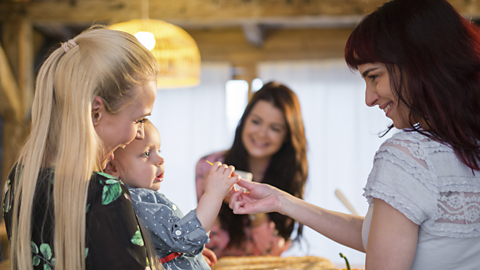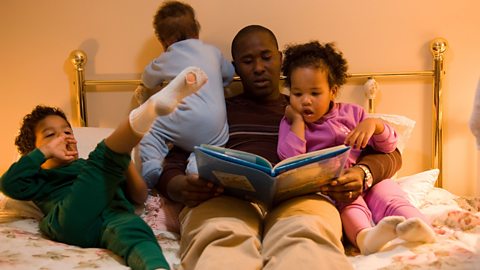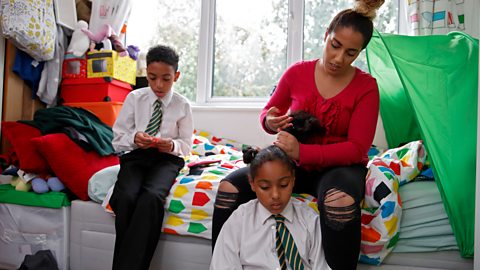Your baby or toddlers first day in childcare is a milestone moment. So its normal to feel a bit worried
We chatted to educational psychologist Dr Alison Gurney to get her top tips about getting ready for this journey with your child.
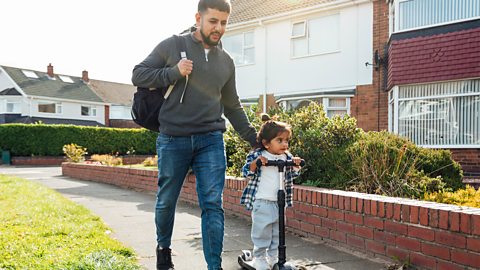
What to do before your baby starts childcare...
There are some simple things you can do in the weeks leading up to their first day.
Get your baby used to other people
Your baby is used to you doing everything for them. So it can be a big change when someone else does something for them.
Dr Gurney says, ÔÇ£In the weeks leading up to your babyÔÇÖs first day, try and change up some of those roles, so they get used to different people.ÔÇØ
Ask family and friends to help. It doesnÔÇÖt need to be every feed or nap time but every small change will help.
Adapt their routine
The routine you've got with your baby might be different to the schedule at your childcare setting.
ÔÇ£It's a good idea to ask them about their routines and chat through what will work best for your child."
For example, if you stroke your babyÔÇÖs arm when they go to sleep, and the nursery won't do that, youÔÇÖll need your child to get used to not having that.ÔÇØ


Start socialising
The pandemic means the usual baby classes and playdates havenÔÇÖt happened, so your child might not be used to being around other babies.
Dr Gurney says, ÔÇ£Try and get your child used to being in different environments and socialising with other people. Whether that's going to a baby class or just meeting a friend for coffee."
Spend time settling in
Your nursery or childminder will offer settling in sessions to help your little one gradually get used to their new environment. And because of the pandemic this year, a lot of nurseries and childminders are planning to do longer settling in sessions.
Be prepared for crying
If you're leaving your baby alone or with someone unfamiliar between the ages of six and eighteen months, they're very likely to start crying when you leave them.
At this age, babies often develop separation anxiety, which is completely normal according to Dr Gurney.
ÔÇ£Babies at this age become more observant as to who is holding them and who people are. Even though itÔÇÖs not a nice experience, the majority of children get through it fine. The staff in the setting will be used to dealing with it.ÔÇØ

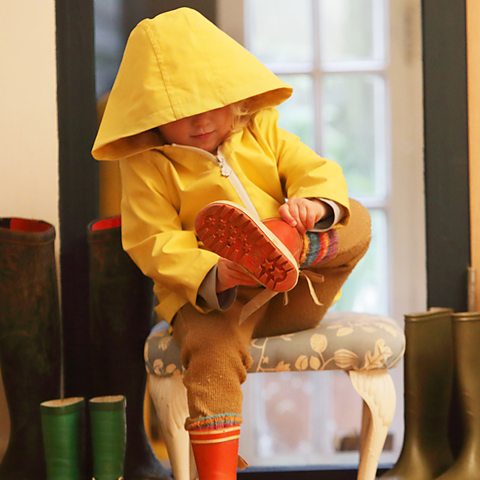
Before your toddler or preschooler starts childcare...
If your child is a bit older, Dr Gurney suggests making the most of their developing language skills and chatting to them about their new childcare setting before they start.
Here are some child-friendly ways to start the conversation:
Use playtime
Children have big imaginations, and you can use fun role-play to help ease their anxiety or confusion.
Words like nursery will be completely new for your child. If you act them out, however, theyÔÇÖll start to understand what you mean.
Ask for a photo of your childÔÇÖs key person
Showing children a photo of the main person who will be looking after them can help them seem less like a stranger.
Alison also suggests dropping their name into your conversations.
ÔÇ£When youÔÇÖre walking to the park you could say, ÔÇÿOh, I wonder if Debbie goes to the park too. WeÔÇÖll have to ask her when weÔÇÖre at nursery.ÔÇÖÔÇØ
Practise different skills
Your child is gaining more independence every day. You can help them by practising key skills in the run-up to their first day, such as putting on their shoes or starting toilet training.
Read books or watch TV
There are lots of picture books about starting nursery, which can help your child get a better understanding of it.
There are also CBeebies programmes about starting childcare, which you can watch together and talk about.

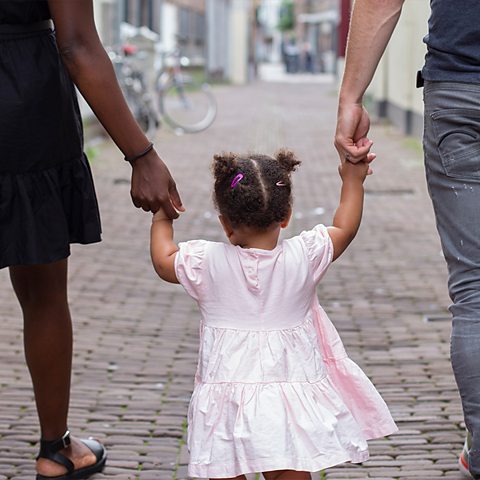
Your childÔÇÖs first day: what to do (and what NOT to do)
Here are Dr GurneyÔÇÖs tips to help them settle into nursery or childcare quickly and happily.
1. Be as prepared as possible
Pack their bag the night before. If youÔÇÖre stressed because youÔÇÖre rushing around trying to get ready, your child will pick up on that.
2. Stick to your childÔÇÖs routine
Make the rest of their day as predictable as possible. Keep to their usual routine in the morning and evening.
3. Pack a comforter
Most settings let you pack a comforter for your child. For older children, you could draw something on both your hands so your child can look at it and feel connected to you.
4. Get support for you
Give yourself permission to feel anxious, guilty or not guilty at all.
5. Think about the positives
YouÔÇÖre building your childÔÇÖs resilience. Going to childcare is a positive way for them to learn new things.
6. Be ready to say goodbye
ÔÇ£It can be really tempting to slip away when your childÔÇÖs back is turned, but we recommend parents donÔÇÖt do thatÔÇØ, says Dr Gurney.
Have a really positive goodbye routine: it could be as simple as saying ÔÇÿI'm is going now and will be back later to pick you up. Have lots of fun.ÔÇÖ Give them a kiss on the head and walk away.ÔÇØ
If your child is upset as you leave, Dr Gurney warns against going back in to see them.
ÔÇ£Unfortunately this gives your child the message that you had to come back because it wasnÔÇÖt safe to leave them there."
If you're worried, you can call the nursery 30 minutes later to check how theyÔÇÖre getting on.
ÔÇ£They will be really used to these calls and itÔÇÖs normal to want that reassurance. But itÔÇÖs likely that within 10 minutes your child will be happily engaged in an activity.ÔÇØ
For more advice on helping older children settle in back to school, check out Parents Toolkit's ultimate 'Back to School guide for parents'.

Why does my child talk more at home than they do at nursery?
This is a very common for our little ones.
At home, they are familiar with their surroundings, the adults, their siblings, and they are more used to their language opportunities, such as asking for milk, mummy, daddy or playing with familiar toys. But some children are reluctant talkers in another environment like nursery.
Notice if they are just shy or if they respond to the adult's help and encouragement in the nursery. Also observe whether they appear to freeze or are nervous and do not respond to anyone trying to respond to them.
If, after a month of consistent nursery attendance, your child is finding it difficult to use the wonderful language skills that they have, you may want to seek some guidance or help from a health visitor or GP.

